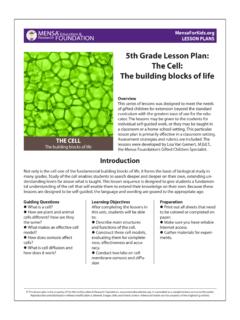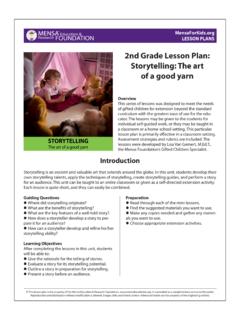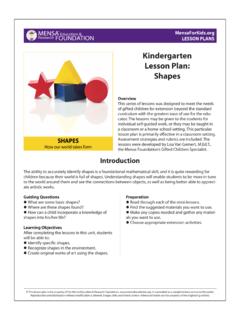Transcription of 7th grade Lesson Plan: It’s Greek to me: Greek …
1 This Lesson plan is the property of the Mensa Education & Research Foundation, It is provided as a complimentary service to the public. Reproduction and distribution without modification is allowed. Images, links and linked content referenced herein are the property of the originating series of lessons was designed to meet the needs of gifted children for extension beyond the standard curriculum with the greatest ease of use for the edu-cator. The lessons may be given to the students for individual self-guided work, or they may be taught in a classroom or a home-school setting. This particular Lesson plan is primarily effective in a classroom setting. Assessment strategies and rubrics are included. The lessons were developed by Lisa Van Gemert, , the Mensa Foundation s Gifted Children Specialist. 7th grade lesson plan :It s Greek to me: Greek MythologyGreek mythology is not only interesting, but it is also the foundation of allusion and character genesis in literature.
2 In this Lesson plan , students will gain an understanding of Greek mythology and the Olympian gods and NOTEDo not give student(s) the filled-in copy of the Gods/Goddesses chart. That is your answer ObjectivesAfter completing the lessons in this unit, students will be able to: l Understand the Greek view of creation. l Understand the terms Chaos, Gaia, Uranus, Cro-nus, Zeus, Rhea, Hyperboreans, Ethiopia, Mediter-ranean, and Elysian Describe the Greek view of the world s geogra-phy. l Identify the names and key features of the Olympian Create their own Create their own myth explaining a natural D Aulaires Book of Greek Myths by Ingri and Edgar Parin D Aulairel The Gods and Goddesses of Olympus by Alikil The Mighty 12: Superheroes of Greek Myths by Charles Smithl Greek Myths and Legends by Cheryl Evansl Mythology by Edith Hamilton (which served as a source for this Lesson plan )l A paper plate for each studentl Internet access to look up relevant sites This Lesson plan is the property of the Mensa Education & Research Foundation, It is provided as a complimentary service to the public.
3 Reproduction and distribution without modification is allowed. Images, links and linked content referenced herein are the property of the originating | Mensa Foundation Lesson plan : Greek MYTHOLOGYA lthough when we think of mythology we think of a collection of stories, there is a beginning to them. Un-derstanding the beginning of the story, the creation of the world, gives us a framework to build upon as we learn about the different short answer to how the Greeks viewed the creation of the world is this: Scary old gods came first; they got stomped down by their kids, who were better looking, younger gods. These gods created humans. Hu-mans and gods fought for supremacy, and the humans won a few rounds but eventually got trounced and became more and more , the longer answer: In the beginning, the universe was without form.
4 It was not nothing; there was matter, but it was unorganized, shapeless, mixed up and dark. This was called Chaos. After Chaos, more divinities, or gods, came into being. Gaia, the Earth, held up Uranus, the sky. Gaia and Uranus had a bunch of kids. First they had a bunch of monsters including the Cyclops, and then they created the Titans as the second generation. Uranus hated all the Titans and was actually quite ugly about it but there are only a couple of Titans that you need to remember: first, Oceanus, the god of the sea, and then Cronus, the strongest and best one of all. Gaia was pretty ticked at Uranus for being a jerk, so she helped Cronus overthrow him. So, let s keep this straight. Cronus is Uranus s son. Cronus became the king (bye-bye Uranus), and married his sister, Rhea another Titan. It s like a soap opera.
5 This was called the Golden Age because men, who had been made by a Titan named Prometheus, were living in harmony. Everything was hunky dory. It didn t last, though, because Cronus heard a prophecy that one of his sons would dethrone him, so every time his wife, Rhea, had a baby, he swallowed it. Rhea got a little sick of seeing all of her children swallowed alive, so she tricked Cronus when her sixth child, Zeus, was born; she wrapped up a rock to look like a baby and had Cronus swallow that instead. Zeus rescued his previously swallowed siblings, and all was right with the world. Lesson 1: Greek creation mythology This Lesson plan is the property of the Mensa Education & Research Foundation, It is provided as a complimentary service to the public. Reproduction and distribution without modification is allowed.
6 Images, links and linked content referenced herein are the property of the originating entities. Mensa Foundation Lesson plan : Greek MYTHOLOGY | 3 World ViewThe Greek view of the world was a little different than ours. The Greeks believed that the world was flat, but circular, like a paper plate. At the center of the Universe was Greece. Their world was divided by the Mediterranean, which means Middle of the Lands in Latin. The river Ocean flowed around the world in a clockwise the north lived the Hyperboreans an extremely happy people for whom life was sweet. When the old people became tired of living, they threw themselves into the sea. This was a land of constant vacation where people were said to live for 1,000 years.
7 In the south lived the Ethiopians. In Greek drama, mention is often made of various gods being in Ethiopia, meaning really far away. So, if I say I parked in Ethiopia this morning, would that mean I m close to my office or far away? The Ethiopians were said to be on good terms with the gods and liked to entertain the west were the Elysian Fields. This was the closest the Greeks got to the idea of heaven; only the best and brightest of the dead people got to go there. To Do1. Read The Gods and Goddesses of Olympus by Aliki. 2. Draw your own representation of the Greek view of the world on the paper plate using colored pencils and the map on the previous page as a guideline. Be sure to include the Ethiopians, the Hyperboreans and the Elysian Fields on your map. 3. Write a one-paragraph essay comparing the Greek view of the world to the contemporary view of it, including at least two points of comparison and two of contrast.
8 You can follow this guideline:u Directions for Paragraph: Begin with a topic sentence. Here is an example:The Greek view of the world both resembles and differs from the contemporary Next, list two ways the views are similar. Here are examples:l The Greek view resembles the contemporary view in that Additionally, the views are similar because Next, list two ways the views are different. Here are examples:l However, the Greek view is not the same as the contemporary view because the Greeks The Greeks also thought Last, you will state a conclusion. Here s an example:Therefore, even though the views have similarities, they differ in important ways. This Lesson plan is the property of the Mensa Education & Research Foundation, It is provided as a complimentary service to the public. Reproduction and distribution without modification is allowed.
9 Images, links and linked content referenced herein are the property of the originating | Mensa Foundation Lesson plan : Greek MYTHOLOGYL esson 2: The Olympian godsUse the information in this Lesson to begin to fill in the gods and god-desses chart at the end of this Lesson ; you will also need to do your own research to complete it. Now that you understand the way that the Greeks viewed the beginning of the world, you are ready to learn about the Olym-pian gods. First, we have to explore exactly what we mean by Olympian gods. Mount Olympus is a real mountain in the north of Greece. Gradually, it became associated less and less with an actual mountain and more with an imagi-nary place high above the earth. According to the ancient Greeks, the gate to Olympus was made of clouds and it was guarded by four goddesses, the Seasons.
10 Each god had his or her own dwelling place, but Olympus was home were up to 14 gods considered Olympian gods. Seven of them were Zeus and his siblings, and seven others were children of Zeus. Sometimes only 12 will be listed. The Greeks and Romans shared mythology, so you will find two names for most was the king of the hill. He was dominating, powerful and had a soft spot for pretty women. He could be terrifying when angry. His symbols were the thunder-bolts, or lightning bolts made for him by the Cyclopes (his uncles); the eagle; and the scepter, or rod. Please copy this information onto your , or Pluto, was the god of the underworld and of the dead. He was called the same names by the Romans, but they also some-times called him Dis or Dis Pater. He was Zeus s brother and married Persephone after kidnapping her against her will.




